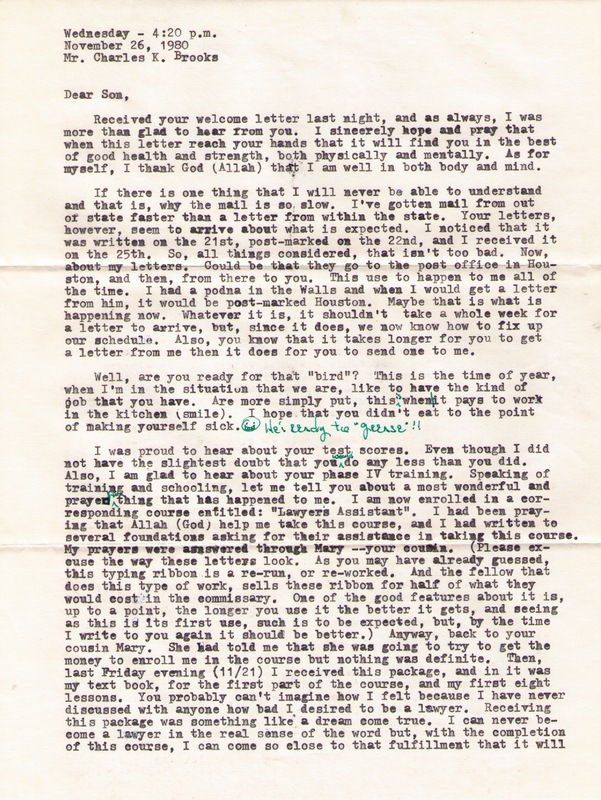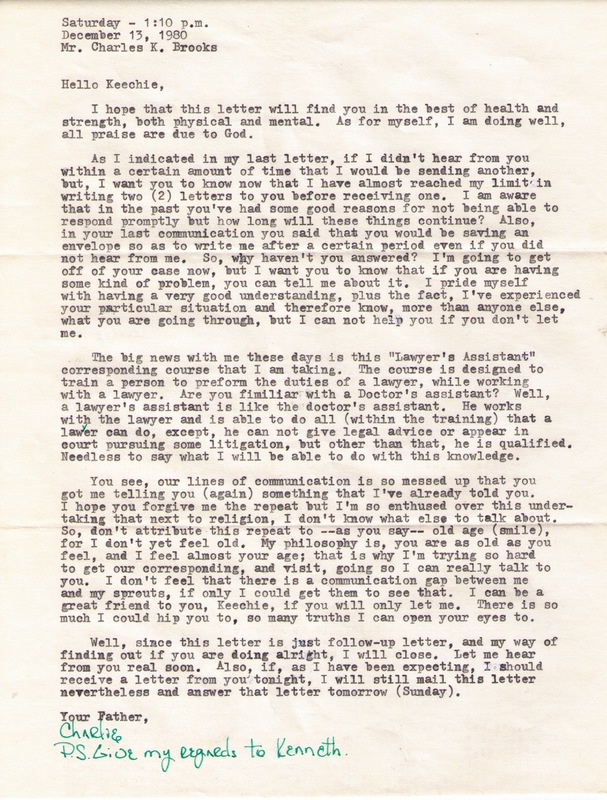The Right to Life
"Everyone has the right to life, liberty, and security of person." Article 3, Universal Declaration of Human Rights
"Everyone has the right to freedom of opinion and expression; this right includes freedom to hold opinions without interference and to seek, receive and impart information and ideas through any media and regardless of frontiers." Article 19, Universal Declaration of Human Rights
The first primary source I studied was a letter from Charlie Brooks Jr. to his son, Keith. This letter spoke about his life and his appreciation of Keith's schooling and job training. He discusses his goal of becoming a lawyer as well and talks about their communication between previous and future letters. This was the first of two letters that Charlie sent to his son, updating him on his life and inquiring about his experiences with school and congratulating him on his excellent test scores.
After listening to Derrek Brooks’ interview, I was able to cite numerous similarities between the topic of discussion and the Universal Declaration of Human Rights (UDHR). The oral history spoke about how his father was sentenced to the death penalty (lethal injection) after committing a kidnapping and a murder. Derrek commented about the difficult relationship he had with his father while he was in prison. He knew that his father was truly a good person at heart, but made some mistakes that would affect him and his family’s life forever. In relation to the UDHR, there are several articles in the document that relate directly to the struggles and hardships that the Brooks family encountered.
One particular article that I found drew parallels to the story of Charlie Brooks Jr.’s death is Article 3. This article states that “everyone has the right to life, liberty, and security of person.” Derrek speaks about how his father deserved to be punished for his crime, but pointed out that other people throughout the country received lesser jail sentences for worse crimes. He believes that Texas is too harsh with their enforcement of the death penalty, executing criminals without fair justification. He says in his interview “the state of Texas is executing people left and right, I think we're the highest executions in the United States. Texas leads everybody in executions.” If the Brooks family had not originated in Texas, one cannot predict what the result of Charlie’s trial would have been.
The second letter, written just seventeen days later, was also written to Keith. In the letter, Charlie asks why he had not heard back from Keith recently, as he was expecting a reply to his first letter. He comments on the difficulty on communication, and how he really wishes that he could receive letters back in a timely manner in order to tell more of his stories about his life. Charlie longs to communicate with his son before his eventual excecution, which dehumanizes him. The rhetoric of the letter implies that he is desperate for this communication, as it is the only thing he has in keeping up with the lives of his family members.
One other article from the UDHR that relates to the letters from Charlie Brooks Jr. to his son is article 19. This article states: “Everyone has the right to freedom of opinion and expression; this right includes freedom to hold opinions without interference and to seek, receive and impart information and ideas through any media and regardless of frontiers.” This article indicates that he may not have had the ability to send these letters to his son while in prison. Charlie speaks about the difficulty of communication from inside prison, where there was often a lag in communication between the sender and the recipient due to logistical issues. This article allows that there is at least some form of communication given as a right to all prisoners, even those sentenced to the death penalty.
Derrek's Oral History: https://tinyurl.com/mkh4dob
By Darien Vitelli


